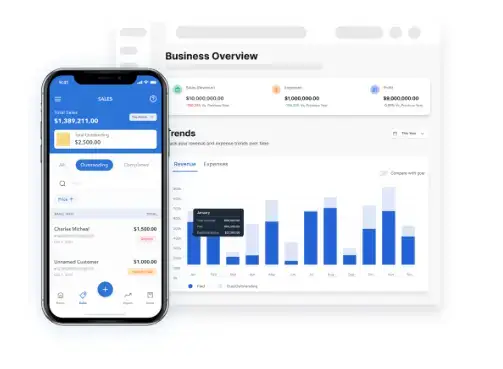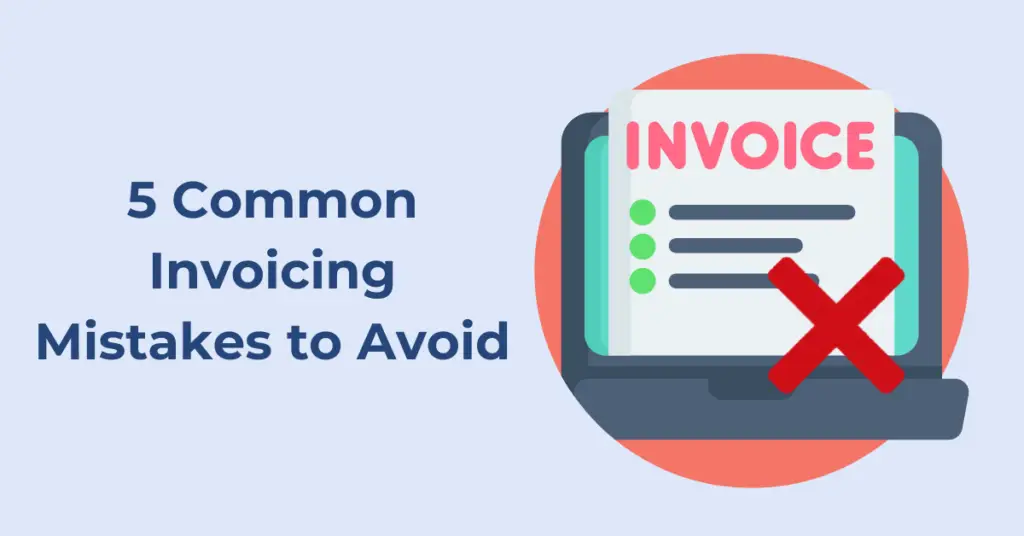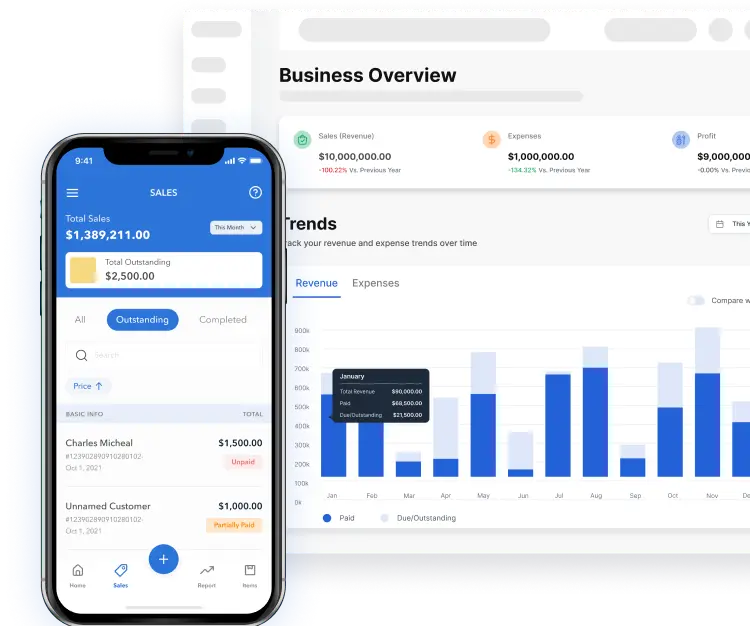Invoicing can be a major headache for many small business owners. According to the Export and Import Bank of the United States, 60% of invoices are paid late which affects cash flow and business operations. Accurate and timely invoicing is crucial for maintaining a healthy business. In this post, we’ll cover five common invoicing mistakes and how you can avoid them to ensure smooth financial management.

What is Invoicing?
Invoicing is creating and sending bills to clients for products or services provided. An invoice is a formal document issued to a client that details the products or services provided, associated costs, and payment terms.
An invoice includes key components such as a unique invoice number, issue date, due date, itemized list of services or products, total amount due, payment terms, and contact information. This process not only maintains professionalism and legal protection but also aids in financial tracking and tax compliance.
Effective invoicing involves delivering the product or service, creating and sending the invoice, following up on payments, and keeping detailed records for financial and tax purposes.
Related Read: Invoicing 101: A Complete Guide for Businesses of All Sizes
5 Common Invoicing Mistakes
- Late Invoicing
- Incomplete or Inaccurate Information
- Not Following Up on Overdue Invoices
- Unclear Payment Terms
- Ignoring Tax and Legal Requirements
Late Invoicing

One of the most common invoicing mistakes small business owners make is not sending invoices promptly. When invoices aren’t sent promptly, clients might forget about the services or products they received, leading to payment delays. Thus, impacting your cash flow and potentially straining client relationships.
Incomplete or Inaccurate Information
Another frequent invoicing mistake is sending invoices with incomplete or inaccurate information. Essential information like dates, itemized lists, and payment terms are often overlooked. Missing or incorrect details can confuse and delay payments. It can also make customers question the professionalism and reliability of your business.
Related Read: Invoicing For Small Businesses: Best Invoicing Procedures
Not Following Up on Overdue Invoices

Unpaid invoices can disrupt your business operations and cash flow. It’s easy to lose track of overdue invoices without a proper system in place. Many small business owners feel uncomfortable following up, but it’s a crucial part of financial management as unpaid invoices potentially lead to loss of revenue.
Unclear Payment Terms
Another common mistake is not clearly outlining the payment terms. This includes the due date, late fees, and accepted payment methods. Ambiguity in payment terms can result in clients setting their payment timelines, which may not align with your cash flow needs. Therefore, leading to disputes and strained client relationships. Failing to specify payment terms may be caused by:
- Making use of vague language in the invoice. For example, phrases like “due soon” or “payment upon receipt”.
- Missing Due Date
- No Payment Instructions e.g., (bank transfer details, online payment options)
- Failing to provide a specific due date (e.g., “Payment due on May 30, 2024”)
Ignoring Tax and Legal Requirements

Non-compliance with tax and legal requirements can result in penalties and legal issues. It’s essential to stay updated with local regulations. Many small business owners overlook the importance of including tax information and adhering to legal requirements in their invoices. This can lead to legal repercussions and fines for non-compliance, complications during tax filing periods, and damage to your business reputation and financial health.
Related Read: Value of Free Accounting Software for Small Business
Best Practices to Avoid Invoicing Errors
Following these best practices can help you avoid common invoicing errors and maintain a smooth, professional relationship with your clients:
1. Adopt an Invoicing Schedule
Setting a regular invoicing schedule is essential. Use invoicing software like Vencru to automate reminders and streamline the process. Make it a habit to invoice clients immediately after delivering a service or product. This keeps the transaction fresh in their minds, reducing the likelihood of disputes.

2. Use a Checklist
Ensure all necessary information is included in every invoice by using a checklist. Double-check details before sending to avoid mistakes. Invoicing software can also help keep you on track. Essential elements of an invoice include:
- Invoice Number: A unique identifier for each invoice.
- Date: The date the invoice is issued.
- Due Date: When the payment is expected.
- Itemized List: Detailed description of services/products provided, including quantities and rates.
- Total Amount due: Clear indication of the total amount the client needs to pay.
- Payment Terms: Instructions on how and when to pay, including late fees if applicable.
- Contact Information: Your business name, address, phone number, and email.
3. Implement a System to Track Overdue Invoices
Keep track of overdue invoices and follow up regularly. Here are some tips for effective follow-up:
- Set Reminders: Use tools like Vencru to keep tabs on payments. Send reminders as the due date approaches and if the payment is overdue.
- Consistent Communication: Start with a friendly reminder, then escalate to more formal requests if necessary.
- Phone Calls: Sometimes, a direct phone call can be more effective than emails. It adds a personal touch and shows your commitment to resolving the issue.
4. State Payment Terms
State payment terms on every invoice. Include the due date, late fees, and accepted payment methods. This ensures that clients are fully aware of when and how to pay, reducing confusion and delays.
5. Consult with an Accountant or Use Accounting Software
Consulting with an accountant or using accounting software that includes tax compliance features is crucial. Vencru, for instance, helps you stay compliant with local tax regulations. Ensure your invoices include applicable taxes with a clear indication of any taxes applied to the total amount.
Eliminate Invoicing Mistakes with Vencru
Invoicing mistakes can disrupt your business, but they’re easily avoidable. By sending invoices promptly, including accurate information, following up on overdue invoices, specifying payment terms, and complying with tax requirements, you can streamline your invoicing process and improve cash flow. Invoicing tools like Vencru can help you avoid common invoicing mistakes.

Vencru is more than just basic invoicing software. It’s a robust solution that simplifies your entire financial workflow. From generating professional invoices in seconds to automating repetitive tasks and monitoring outstanding payments, Vencru enables you to:
- Save Time: Concentrate on what truly matters – growing your business – by removing the need for manual invoicing and data entry.
- Minimize Errors: Avoid human errors with automated calculations and maintain precise financial records.
- Enhance Cash Flow: Speed up payments with automated reminders and online payment options.
- Gain Insights: Monitor key financial metrics and make informed decisions to optimize your business.
Ready to explore Vencru? Get started here or book a demo
Related Read:






